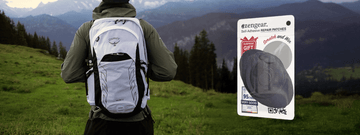12 Essential Bushcraft Skills for Beginners: A Guide to Thriving in the Wilderness
by Emily Jannet on Aug 30, 2023
The allure of the great outdoors has captivated human beings for generations, beckoning adventurers to explore the untouched beauty of nature. Bushcraft, the art of thriving in the wilderness through essential survival skills, is a time-honored tradition that allows individuals to connect with nature on a deeper level. Whether you're a seasoned outdoor enthusiast or a beginner looking to embark on your first wilderness journey, mastering these essential bushcraft skills will not only enhance your experience but also ensure your safety and success in the wild.
-
Firecraft: The Heart of Bushcraft
The ability to start a fire is arguably the most crucial skill in bushcraft. Fire provides warmth, light, and a means of cooking food. Beginners should learn various fire-starting techniques, from using a simple fire starter to more traditional methods like the bow drill or flint and steel. Knowing how to source dry tinder and kindling is equally important to ensure a sustainable fire.
-
Shelter Building: Crafting Your Wilderness Home
Crafting a suitable shelter is vital for protection against the elements. As a beginner, start with simple structures like lean-tos or debris huts. Learn to select an appropriate site, gather materials, and construct a shelter that shields you from rain, wind, and cold temperatures. Mastering these skills ensures that you're prepared to create a safe haven wherever you find yourself.
-
Water Sourcing and Purification: Nectar of Life
Access to clean water is non-negotiable for survival. Beginners must know how to locate water sources, even in challenging terrains. Learning purification techniques such as boiling, using water filters, or constructing a basic solar still can help you avoid waterborne illnesses and stay hydrated during your wilderness sojourns.
-
Foraging and Wild Edibles: Nature's Supermarket
The wilderness is a treasure trove of edible plants, but it's crucial to differentiate between what's safe to eat and what's not. Invest time in learning to identify common wild edibles in your region. Books, online resources, and local experts can provide valuable insights. With practice, you'll be able to supplement your diet with nutritious finds from nature's pantry.
-
Navigation: Finding Your Way
A compass and map are essential tools, but beginners should also develop their natural navigation skills. Learn to read the sun, stars, and landmarks to orient yourself in unfamiliar territory. By honing your navigation abilities, you'll boost your confidence and reduce the risk of getting lost.
-
Knife Skills: Your Trusted Companion
A reliable bushcraft knife and a folding saw are arguably your most valuable tools in the wild. From crafting tools to processing food, a well-maintained tool is essential. Beginners should learn how to select the right knife and saw, maintain their sharpness, and practice safe handling. Remember, a sharp knife is safer than a dull one.
-
Cordage Crafting: Tying It All Together
Crafting strong cordage from natural materials is a skill that has myriad applications, from building shelters to creating traps and tools. Learn various methods of cordage creation, such as using plant fibers or animal sinew. As a beginner, mastering these techniques will give you the flexibility to tackle a wide range of tasks.
-
Campcraft: Comfort in the Wild
Bushcraft isn't just about survival; it's about thriving in the wilderness. Campcraft involves creating a comfortable living space. Learn to make comfortable bedding from natural materials, set up a drying rack for wet clothes, and establish an organized camp layout. These skills enhance your overall experience and make your time in the wilderness more enjoyable.
-
Tool Craftsmanship: Crafting Tools for Survival
Incorporate tool-making into your skill set. Learn to fashion tools from natural materials, such as bone, wood, and stone. Craft tools like spears, traps, and containers to aid in hunting, trapping, and food preparation.
-
Mindset and Adaptability: The Psychology of Survival
Possessing the right mindset is the foundation of survival. Stay calm, positive, and adaptable in challenging situations. Embrace the learning process and be open to adapting to the environment. Develop resilience and resourcefulness to overcome obstacles and thrive in the wild.
-
First Aid: Safety First
Accidents can happen even to the most experienced outdoorsmen. Basic first aid knowledge is crucial for addressing injuries and emergencies in the wild. Create a wilderness first aid kit and educate yourself on treating common outdoor-related injuries. Being prepared can make all the difference in critical situations.
-
Ethical Outdoor Practices: Leave No Trace
Responsible bushcrafting involves leaving the wilderness as untouched as possible. Practice the "Leave No Trace" principles: minimize your impact on the environment, pack out what you pack in, and respect wildlife. By adopting ethical practices, you help preserve the beauty of nature for future generations.
Conclusion
Embarking on a journey into the world of bushcraft is a thrilling endeavor that connects you with nature in profound ways. As a beginner, mastering these essential bushcraft skills lays a strong foundation for your outdoor adventures. From firecraft to ethical outdoor practices, each skill equips you with the knowledge and confidence to thrive in the wilderness while respecting and cherishing the beauty of the natural world. So, embrace the challenge, learn from each experience, and forge a deeper connection with the great outdoors through the art of bushcraft.






